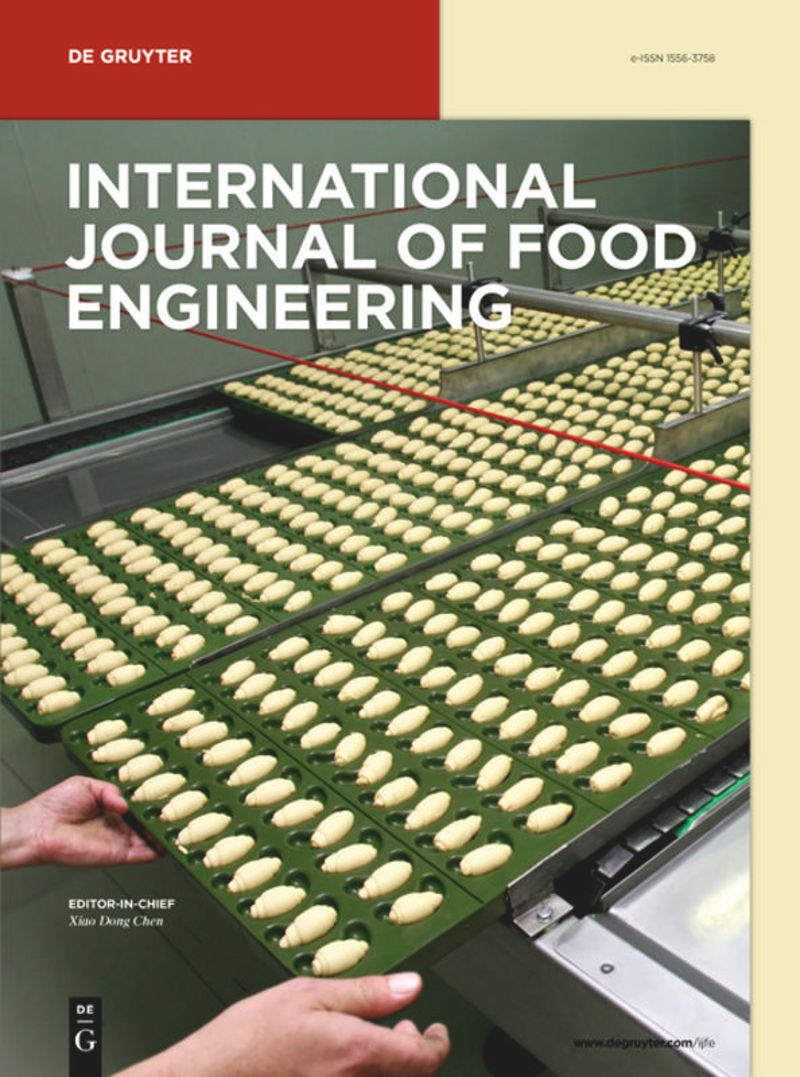Multiphase flow, heat and mass transfer modeling during frying of potato: effect of food sample to oil ratio
IF 1.4
4区 农林科学
引用次数: 2
Abstract
Abstract Sample to oil ratio (SOR) during frying of food products should be carefully determined because it substantially influences oil absorption. A novel computer simulation to model momentum, heat, and mass transfer was developed to investigate the effect of SOR (1/10, 1/15, and 1/20) on velocity, temperature, moisture, and oil distributions during frying of potato strips. The present study was intended to cover missing aspects in scientific literature dealing with potato frying modeling. In addition, one of the major contributions offered by this work regarded the possibility of major effect of SOR on healthiness of products. An increase in water vapor production at a higher SOR played a significant role in increasing oil velocity. While the SOR did not have a substantial effect on center temperature of potato strips, surface temperature decreased with an increase in SOR. The SOR affected moisture content of the corners of the specimens, whereas it did not significantly affect the center moisture. Simulation of the longitudinal section of potato center showed that oil uptake increased with increasing SOR. The decrease in oil uptake by decreasing SOR was justified by the water vapor production and crust formation. Water vapor acted as a barrier against oil diffusion and had a significant impact on stirring the oil and creating homogeneous temperatures. Overall, this study offered a proper numerical tool to control oil absorption, leading to understanding complex mechanisms during deep-fat frying of foods. It is hoped that the results of this study could head to a further step in developing an optimized deep-fat frying process.马铃薯煎炸过程中多相流、传热传质模拟:食物样油比的影响
摘要食品油炸过程中料油比(SOR)的测定对食品的吸油率有重要影响。为了研究SOR(1/10、1/15和1/20)对油炸土豆条过程中速度、温度、水分和油分布的影响,开发了一种新的计算机模拟方法来模拟动量、热量和质传递。本研究旨在弥补有关马铃薯油炸模型的科学文献中缺失的方面。此外,本工作的主要贡献之一是考虑了SOR对产品健康的重大影响的可能性。在较高的SOR下,水蒸气产量的增加对油速的增加起着显著的作用。SOR对马铃薯条中心温度无显著影响,表面温度随SOR的升高而降低。SOR对试件边角含水率有影响,而对试件中心含水率影响不显著。马铃薯中心纵剖面的模拟表明,随着SOR的增加,吸油量增加。水蒸气的产生和结壳的形成证明了由于SOR的降低而导致的吸油量的减少。水蒸气作为油扩散的屏障,对油的搅拌和均匀温度的产生有重要的影响。总的来说,这项研究提供了一个适当的数值工具来控制油的吸收,从而了解食品在深油炸过程中的复杂机制。希望这项研究的结果可以在开发优化的深脂肪油炸工艺方面迈出进一步的一步。
本文章由计算机程序翻译,如有差异,请以英文原文为准。
求助全文
约1分钟内获得全文
求助全文
来源期刊
CiteScore
3.20
自引率
0.00%
发文量
52
审稿时长
3.8 months
期刊介绍:
International Journal of Food Engineering is devoted to engineering disciplines related to processing foods. The areas of interest include heat, mass transfer and fluid flow in food processing; food microstructure development and characterization; application of artificial intelligence in food engineering research and in industry; food biotechnology; and mathematical modeling and software development for food processing purposes. Authors and editors come from top engineering programs around the world: the U.S., Canada, the U.K., and Western Europe, but also South America, Asia, Africa, and the Middle East.

 求助内容:
求助内容: 应助结果提醒方式:
应助结果提醒方式:


